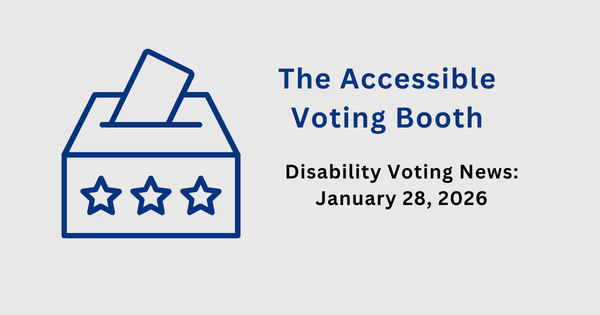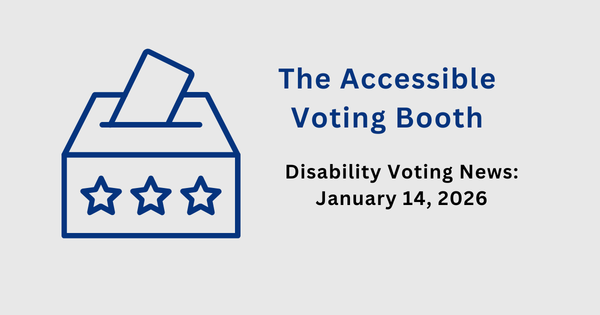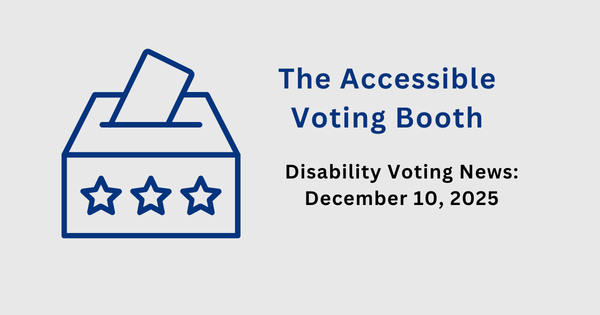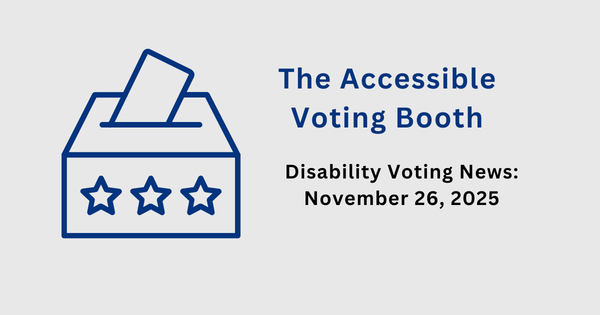Disability Voting News: September 17, 2025
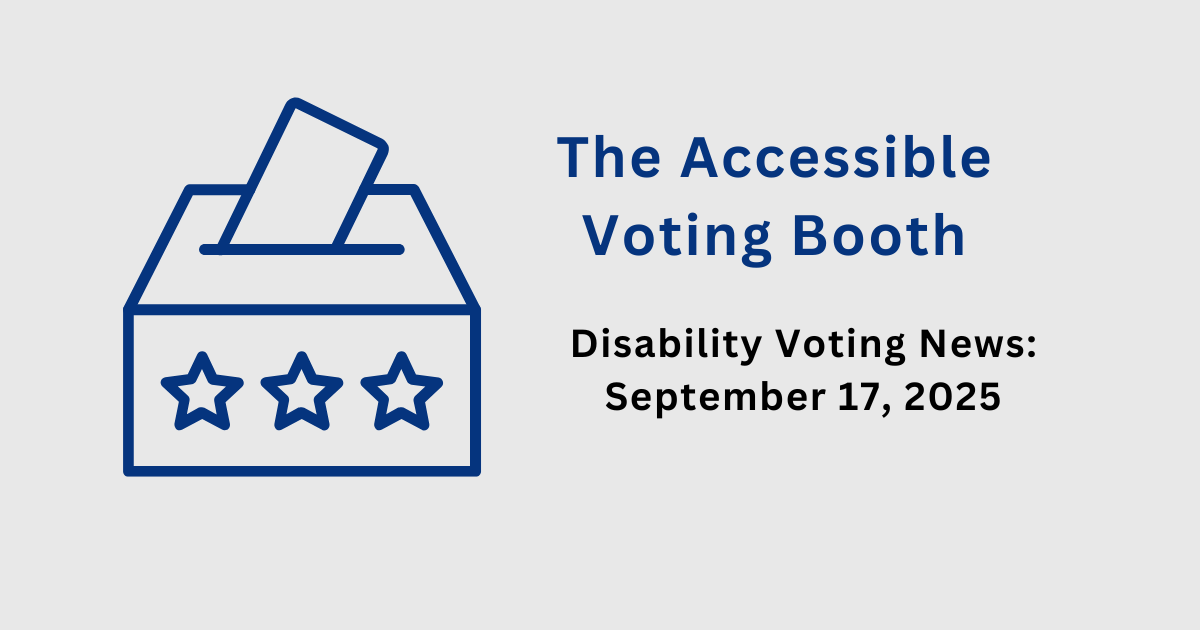
Welcome to The Accessible Voting Booth for September 17, 2025. In this week's issue, we're going to talk about voting rights restoration in Virginia, Maine's restrictive Question 1 on the ballot in November, and the Fifth Circuit Court of Appeals upholding provisions in Texas's S.B. 1. I'm sorry to say we don't have happier voting news this week, so in lieu of that, here's Oliver and Oscar on a walk:

Federal appeals court affirms Virginia felony disenfranchisement and voting rights restoration system (via The Markup).
Earlier this month, the U.S. Court of Appeals for the Fourth Circuit upheld Virginia’s system of disenfranchising people with prior felony convictions and voting rights restoration that runs through the governor. Virginia is one of four states that does not offer automatic rights restoration after the completion of a sentence. George Hawkins, who was previously convicted of a felony, petitioned Governor Glenn Youngkin to restore his voting rights, and to date, Governor Youngkin has not restored his rights. Hawkins argued that the current system that equips only the Governor with the power to restore voting rights is a violation of the Constitution and that the lack of a definite timeline for the restoration process violates the First Amendment. The U.S. Court of Appeals for the Fourth Circuit upheld a lower court’s summary judgment in favor of Commonwealth officials.
As I’ve mentioned in many previous newsletters, voting rights restoration for returning citizens is a significant disability rights issue due to the number of incarcerated people with disabilities. From my March 12, 2025 issue:
“According to the Prison Policy Initiative, 40% of people in state prisons have a disability while only comprising 15% of the U.S. general population (per Census Bureau reporting of disability). From the Center for American Progress: “prison inmates are four times as likely and jail inmates more than six times as likely to report a cognitive disability than the general population,” and 1 in 5 inmates have reported a mental illness.”
Additionally, we know that the criminal justice system is influenced and sculpted by this country’s ingrained forces of white supremacy: racially marginalized people are disproportionately overrepresented in the criminal justice system, and innocent Black people are 19 times more likely to be convicted of drug crimes than innocent white people despite the fact that both populations use illegal drugs at similar rates.
Leaving voting rights restoration up to the discretion of the governor means that restoration is generally dependent upon the whims of one individual who has their own opinions and political agenda.
It’s an inherently biased system where returning Virginia citizens continue to largely be disenfranchised, whereas returning citizens in other states have their rights restored, as they should. Returning citizens have completed their sentences, yet they continue to be punished by the state through the denial of their rights.
More information on Maine’s restrictive ballot measure that will impact voter ID, early voting, and vote by mail (via Ballotpedia).
The September 15 issue of The Markup shared more information about Maine’s Question 1, which will have several restrictive impacts on voting if passed in the November 4 General Election. As noted in The Markup:
“In November, Mainers will vote on Question 1, which would: 1) impose a strict photo ID requirement for in-person voting; 2) require mail voters to provide a driver’s license number or photocopy of a photo ID; 3) move the end of early voting earlier to the seventh day before Election Day; 4) end the ability of all voters to sign up to receive mail ballots on an ongoing basis; and 5) prohibit drop boxes anywhere other than outside the registrar’s office, among other changes. Nearly half of all Maine voters cast ballots by mail in 2024.”
To obtain a ballot, Mainers would have to show a state-issued driver’s license or non-driver ID, passport or passport card, or military ID. According to a study by the Center for Democracy and Civic Engagement at the University of Maryland, 9% of Americans do not have a non-expired driver’s license, and an additional 12% have a non-expired license that does not have both their current address and name, which would most likely be required for verifying their identity to vote. Meanwhile, disabled Americans are disproportionately less likely to have proper ID: 20% of disabled people do not have a non-expired license (as compared to 6% of nondisabled people) and 9% have a non-expired license that lacks their current name and address (as compared to 13% of nondisabled people). Additionally, more than 140 million Americans do not have a passport.
Save Maine Absentee Voting notes that Question 1 came about as part of the “Voter ID for ME” campaign, “sponsored by the Dinner Table PAC and far-right political financier Leonard Leo.” They explain that this referendum would make it more difficult for elderly voters, people with disabilities, rural Mainers, and voters who are out of state on Election Day to vote. Additionally, voters who need assistance with picking up and returning an absentee ballot would no longer be allowed have a friend or family member pick up or return their ballot for them.
Save Maine Absentee Voting has formed to educate voters on how Question 1 will restrict voting access and to canvass across the state of Maine to defeat this ballot question. They will have a statewide Day of Action from October 3 to 5 where Mainers can canvass or participate in virtual phone banks. Head over to Save Maine Absentee Voting to learn more about how you can get involved.
Fifth Circuit Court of Appeals upholds provisions of Texas S.B. 1 on voter assistance. (via The Markup).
On August 29, the Fifth Circuit Court of appeals reversed a lower court judgment and upheld provisions of Texas S.B. 1 that require individuals assisting voters to provide personal information including their name, address, relationship to the voter, and whether they receive any compensation for assistance. Additionally, assistors must swear an oath that they did not influence the voter they are assisting and must not receive compensation for assisting voters.
Voting rights groups have been concerned over these provisions because they deter volunteers from helping voters at the polls and deter voters from seeking assistance, which means that voters with disabilities and other voters who need assistance may not get the help they need, or may not be able to vote at all. Voters and volunteers who are racially marginalized may also face more intense scrutiny under such voter suppression laws.
With regard to the prohibition on receiving compensation, the Brennan Center for Justice states that this provision “prohibits civic organizations from supporting community members who have trouble filling out the forms.” The provisions of S.B. 1 make it more dangerous for voters with disabilities to ask for assistance because of the heightened penalties that assistors face. Toby Cole, a disabled voter who served as a witness in LUPE v. Texas which challenged S.B. 1, “testified that he must choose between potentially putting somebody whom he chooses ‘in harm’s way’ and ensuring ‘he has the things that [he] need[s] to make sure [he] can vote properly.’”
Voter assistance has come under attack in other states such as Alabama, as Republicans claim that such assistance is ballot harvesting, or the act of ballot collections by third parties (such as volunteers or civic organizations). Republicans claim that ballot harvesting can allow third parties to influence or coerce vulnerable voters and tamper with ballots. Voting rights groups argue that ballot collection allows voters who have greater difficulty casting their ballot, such as voters with disabilities and elderly voters, to receive the assistance they need to exercise their right to vote.
In Texas, voters who need assistance will have to continue to follow S.B. 1’s restrictive requirements, and some voters and assistors may decide that the heightened scrutiny and penalties on voting assistance in a state that has passed a significant amount of voter suppression legislation in recent years is too much of a risk.
As always, if you’d like to support the newsletter and my work, here’s how:
- Subscribe to the Accessible Voting Booth newsletter.
- Share this newsletter with your network to spread the word about disability voting rights.
- Leave me a tip. Thank you for supporting my work!

